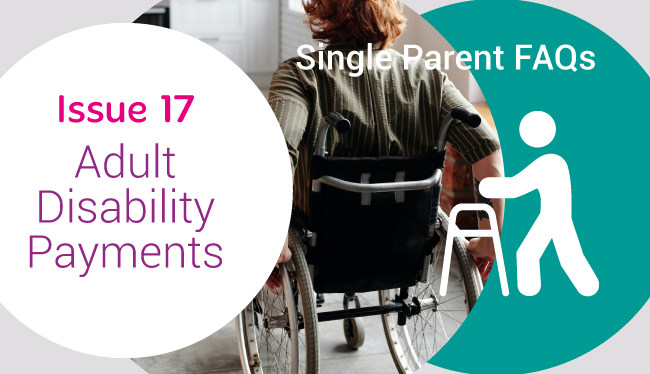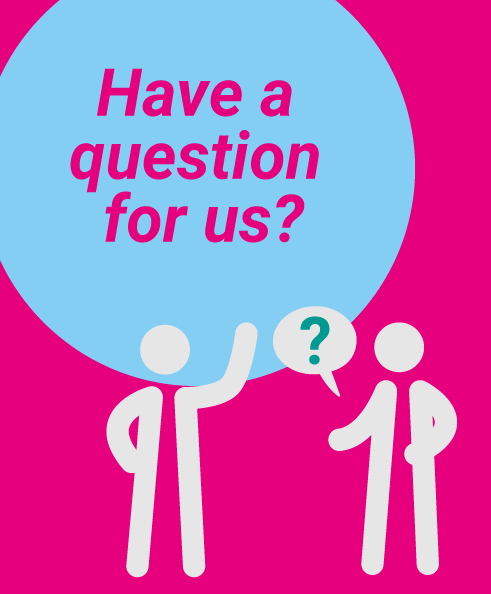Single Parent FAQs: Adult Disability Payment

29/09/2022
Our advice and information team who work on our Lone Parent Helpline, webchat and Ask a Question feature, receive questions from single parents around Scotland every day.
Our new feature – Single Parent FAQs – on our newsletter and blog spotlights Frequently Asked Questions on a different topic each month.
This month, our advice team have been receiving a lot of calls from single parents regarding a new benefit, Adult Disability Payment.
This is a new benefit from the Scottish Government to help with the extra costs that adults with a disability or medical condition may have. It has replaced Personal Independence Payment (PIP) and Disability Living Allowance (DLA) for adults in Scotland.
Take a look at the FAQ's
Who can get Adult Disability Payment?
To get Adult Disability Payment you must meet the following conditions:-
- be living in Scotland
- be 16, or over, and under pension age when you apply
- not be getting DLA or PIP
- need help with your personal care because of their physical or mental disability or illness and/or
- need help when moving around because of your physical or mental disability or illness and
- have had your disability or illness for 13 weeks before you apply and be expected to have it for at least 39 weeks after.
You do not need to have a diagnosis but will have to provide evidence of how your disability or health condition affects you. If you have a progressive illness that will limit your life expectancy you do not need to have had the illness for 13 weeks before you can get Adult Disability Payment.
Is it the same as DLA and PIP?
Adult Disability Payment is very similar to PIP and DLA but it comes from the Scottish Government rather than DWP. It provides money to pay for the extra expenses you have because of a physical or mental ill health condition or disability. It is the same amount of money but it can be given for a longer period before a reassessment is required.
Can I get Adult Disability Payment and PIP or DLA?
No. If you are getting PIP or DLA you cannot also get Adult Disability payment. You will be transferred from PIP or DLA to Adult Disability Payment before 2025.
My health has gotten worse, and I now need help to cook and wash. Can I still apply for PIP?
No, but you can apply for Adult Disability Payment instead.
Can I refuse to be transferred from PIP to Adult Disability Payment?
No. You cannot choose to keep PIP or DLA rather than get Adult Disability Payment.
I’m already getting PIP. Can I swap to Adult Disability Payment?
No. You will automatically be moved from PIP to Adult Disability Payment. You will receive a letter telling you when this will happen.
How much is it?
The amount you will get depends on the help you need to get around and complete everyday tasks.
There are 2 amounts called components. The daily living component is to help with the day-to-day help you need with things like dressing, washing and eating. The mobility component is to help with the extra help you need to physically get around and to stay safe when you are moving about.
Each component has 2 rates.
Daily living component:
- Enhanced rate £92.40
- Standard rate £61.85
Mobility component:
- Enhanced rate £64.50
- Standard rate £24.45
If you have a progressive, terminal, illness you will automatically get the highest rates of both the daily living and mobility components.
How do I apply for it?
You can apply online.
To apply by phone or to arrange an appointment for someone to help call:
Social Security Scotland on 0800 182 2222, 8am – 6pm, Mon – Fri.
Where can I get help to apply?
Social Security Scotland can arrange an appointment with someone from their local support teams to help you with an application.
You can contact Social Security Scotland by phone on 0800 182 2222, 8am – 6pm, Mon – Fri.

See our previous issues of Single Parent FAQs on:
- Having a baby
- Housing options
- Child maintenance
- Child contact
- Universal Credit
- Getting back into education as a single parent
- Financial support for single parents
- Bridging payments and help for Christmas
- Social Security Scotland
- What happens when my child gets older
- Separation and divorce
- Support for students
- Domestic abuse
- When does Child Benefit stop?
Remember you can submit your own question via the Ask A Question feature on our website any time and our expert advisers will respond.